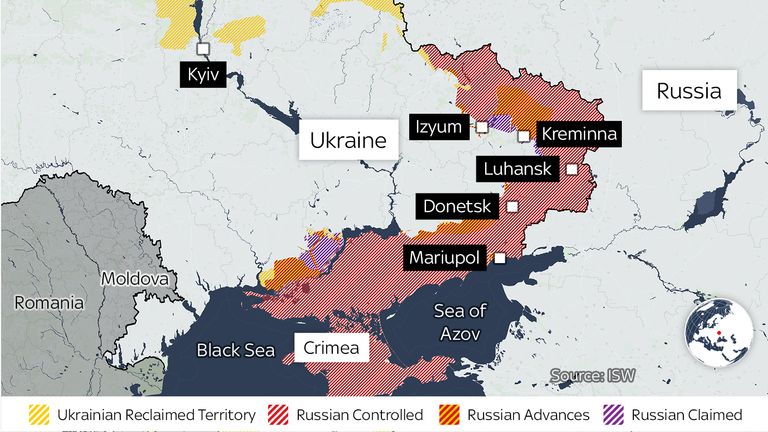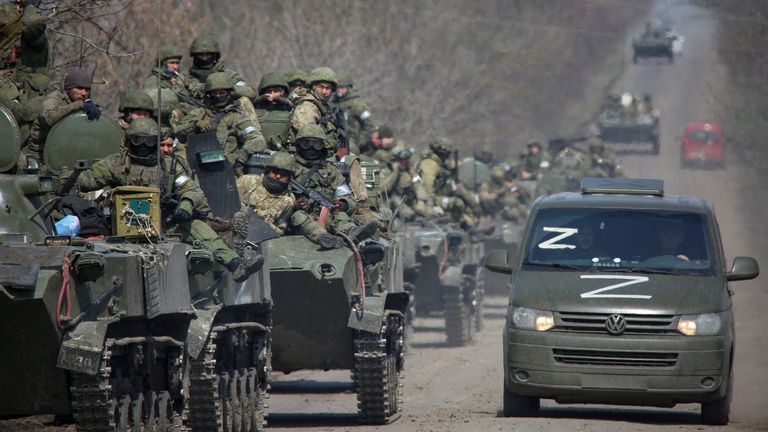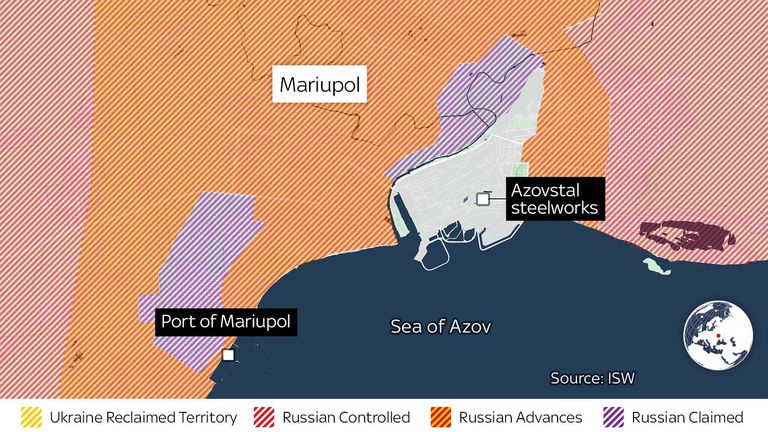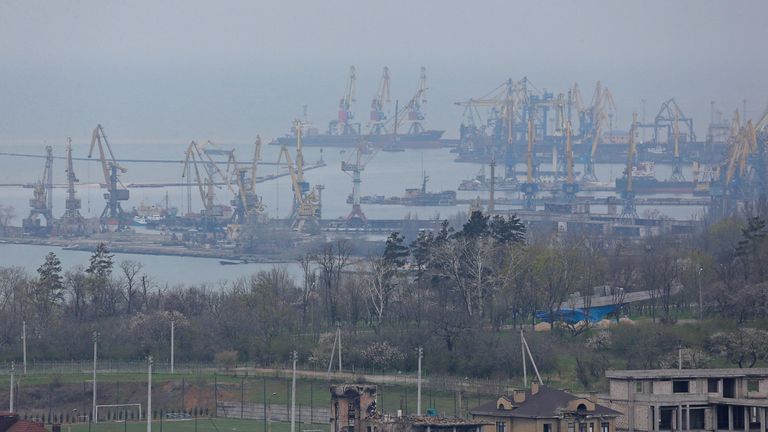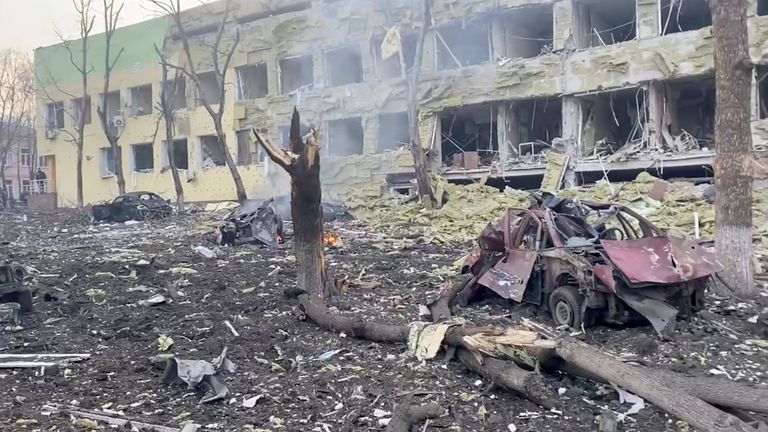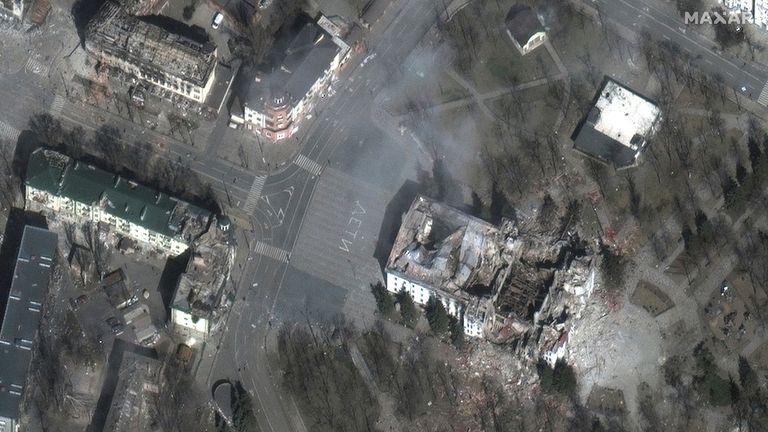[ad_1]
The Ukrainian city of Mariupol is expected to fall to Russian forces soon.
What used to be a port city and trade hub of almost half a million people now lies in ruins.
More than 20,000 civilians have reportedly died, many more have been injured, and thousands have been forced to flee.
Russia ‘trucking dead bodies from Mariupol’ – see latest Ukraine updates
Ukrainian fighters have fought off Russian troops there for almost two months, but are now heavily outnumbered around their final stronghold, the Azovstal steelworks.
As President Vladimir Putin prepares to blockade the plant and capture the besieged city, Sky News looks at why Mariupol is so important to both sides.
Russia
Land corridor between Crimea and Donbas
If the Russians were to take Mariupol, they would occupy an interrupted strip of land from the Crimean Peninsula in the south, which they seized in 2014, through to the Donbas region in the east.
This would enable them to join up their troops currently stationed in the south and the north east.
It would also mean the Russians controlling 80% of the Black Sea coastline, which is vital for Ukrainian and international trade.
“From a military standpoint, Mariupol is the last area the Russians needs to secure a land corridor all the way from Russia proper to Crimea,” Ed Arnold, research fellow on European security at the defence think tank RUSI, told Sky News.
“The fact they haven’t been able to do that in 56 days is probably a major source of embarrassment for them. They weren’t expecting the amount of resistance they’ve had from the Ukrainians.”
‘Rescuing’ former Russian territory
Vladimir Putin views the entire area around the Black Sea, including Mariupol, as historically part of Russia.
The Russian Empire claimed it as Novorossiya (New Russia) in the 18th century after fighting off the Ottomans there.
More people in the south and east of Ukraine also speak and consider themselves ethnically Russian.
Although it has not been part of Russia since the breakdown of the Soviet Union in 1991, Mr Putin wants to recreate a Soviet-style ‘sphere of influence’ there.
But the brutal nature of the war has made this more difficult, Mr Arnold says.
“The way the Russians have prosecuted this campaign has made even previously pro-Russian areas quite anti-Russian – to the extent that it’s now going to be quite difficult for them to control them.”
‘De-Nazifying Ukraine’
Mr Putin has repeatedly claimed one of Russia’s main reasons for invading Ukraine is getting rid of its government, which he says is “run by little Nazis”.
Although dismissed as absurd by many, particularly as President Volodymyr Zelenskyy is Jewish, Mariupol does play into the Kremlin’s ‘anti-Nazi’ propaganda.
It’s home to a militia group called the Azov Brigade, an extreme Ukrainian nationalist group that previously had links to neo-Nazism and the far right.
Subscribe to the Daily podcast on Apple Podcasts, Google Podcasts, Spotify, Spreaker
But Mr Arnold says: “They call it a brigade, but it’s only around 900 people. In reality it’s a very small part of the Ukrainian Army.
“It formed during the resistance to the Crimea operation in 2014. But it has made steps to move away from its far-right links and has merged with the wider Ukrainian National Guard.”
Capturing Mariupol would be the biggest Russian military victory of the war so far, Mr Arnold adds, and would also serve as a propaganda tool at the upcoming Russian Victory Day parade in Moscow on 9 May.
Paralysing the Ukrainian economy
Mariupol is a key port city on the Black Sea and the Azovstal steelworks, where the last remaining Ukrainian defenders are holed up, is one of the largest plants in Europe.
The Russian onslaught in Mariupol has decimated Ukraine’s ability to produce iron and steel but also to ship it, along with its coal and grain exports, to the rest of the world.
“The Black Sea is essentially completely blockaded by the Russians already. Ukraine can’t really do anything about that – and is having to take that huge economic hit,” Mr Arnold says.
Former air vice-marshal Sean Bell adds that Russia has tried to avoid completely destroying the steelworks or the port.
“Quite a lot of Ukrainian trade is done by sea, so naturally that’s something the Russians would like to control,” he told Sky News.
“It wants to take over infrastructure it can use, but the Ukrainian response has been so dogged, it’s had to resort to the total bombardment of its enemy and beating them into submission.”
Ukraine
Stopping Russian advance to the east
After giving up on taking Kyiv in the north, Russia rushed to move its troops south towards Mariupol and east towards the Donbas.
But while Mariupol still holds out, the Kremlin’s forces can’t commit as many soldiers to their ‘next phase’ of the war – the battle for the Donbas – as it would like.
“If the Ukrainians continue to fight, they prevent the Russians from sending their forces north,” Mr Arnold says.
“Mariupol has essentially been sacrificed to make sure the Russians can’t go elsewhere.
“The defence there will go down as one of the most significant actions of the first phase of the war, along with the battles at Hostomel Airport and Bucha, which stopped the Russians taking Kyiv.”
Showing level of Russian brutality
Around 90% of the buildings in Mariupol have been destroyed, including homes, hospitals and schools.
Although devastating, the reported use of chemical weapons in the city, attacks on a maternity hospital, and a theatre being used as a civilian shelter have strengthened Western support of Ukraine.
“Mariupol has shown the Russians for who they really are – very, very brutal,” Mr Arnold says.
“The type of events we’ve seen there have affected how we in the West have viewed the conflict and the level of support we’ve given.”
Another blow to Russian morale
The Ukrainians holding out in Mariupol has proved another blow to an already extremely low morale among Russian soldiers.
Despite being one of the very first targets when the war broke out, there are still around 1,000 defenders left and the city has not yet officially fallen.
“The Russians have been fighting for two months now without a break,” Mr Arnold says.
“While some forces are coming in completely green from elsewhere, the others have just come from suffering heavy losses in the north of the country.
“Morale is as low as it possibly can be on the Russian side and that matters because both them and the Ukrainians are gearing up for quite a significant battle in the Donbas.”
Mr Bell adds: “In Mariupol the Ukrainians have been given the dilemma of surrender or die and they’ve chosen not to surrender.
“If you’re showing that you’re not going to give in, you’re going to erode the morale of your enemy.”
Although the Ukrainians are outnumbered in troops and firepower, their experience in the Donbas over the past eight years means they still “have a chance” as they enter the next phase of the war, Mr Arnold adds.
[ad_2]
Source link
